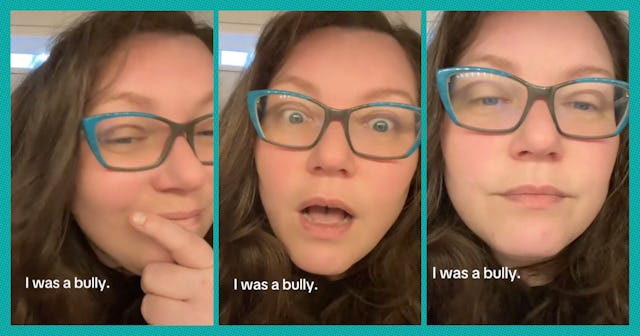Former Bully Shares How Her Mom Got Her To Change
“I never want to let go of that shame. That shame is good. That’s good shame.”

As a parent, I almost don’t know which would be worse: finding out your child is being bullied or finding out that they are a bully. On the one hand, being bullied as a child can affect a person for the rest of their life. In extreme cases, bullying can even lead to self-harm and suicide. But I feel like, as a parent, you might have an easier time helping a child through being bullied than knowing what to do if you find out your child is the bully. Recently, TikTok user @absurdoblivion, who refers to herself as Steph, shared a story about the effective method her own mother used when she was a child that prevented her from ever re-offending.
“The first skill that you have to build in the bully is empathy,” she says.
Steph shares that she was gentle-parented. Throughout her childhood, she didn’t really have punishments, but she suffered through plenty of natural consequences. Steph says this was more effective than a punishment because on top of being unpleasant they really prompted her to change her behavior.
So when a neighbor came over to tell Steph’s mother that Steph had been saying really mean, cruel things to her daughter, Lisa, for a few weeks on the bus, Steph’s mother was absolutely furious. Empathy and compassion were core family values, and her disappointment could not be overstated.
“Now my mom had a couple choices,” Steph recalls. “She could not believe that her daughter would ever do such a thing or she could believe that her daughter could do that and then hold her daughter accountable to that behavior.”
Steph’s mom confronted her, letting her know she was “shocked and disappointed,” noting that both Lisa and her mom were extremely hurt.
“In my mind I’m like ‘Oh no. ... Everybody knows. It’s no longer a secret,’” Steph explains. “The evil, awful, atrocious things I was saying — everybody knows about them.”
Steph conceded that she should apologize to Lisa. Her mom agreed... and didn’t want to wait a moment longer, telling Steph to “march your ass” to Lisa’s. This was made all the more harrowing for Steph because her mom “was not a ‘March your ass’ girl.”
The confrontation went as awkwardly for Steph as you would imagine. Lisa was there. Lisa’s mom was there. Steph’s mom was there. And Steph apologized in front of all of them.
“I said, ‘Lisa, I’m really sorry for the things I’ve been saying to you,’” she says. “And my mom says ‘Such as...?’”
Oh. Steph’s mom was demanding precision. She wanted her daughter to shine a light on the severity of her behavior by making her apologize by repeating all those horrible things in front of everyone, once to Lisa and once to her mother. Including cruel things she said about Lisa’s dead father.
Thinking back on that moment, Steph says, still feels terrible. But it’s a sinking sense of dread that she holds onto.
“I never want to let go of that shame,” she says. “That shame is good. That’s good shame.”
The apology was accepted, Steph was (eventually) forgiven, and as teenagers, she would apologize to Lisa again, this time unprompted. Because of the way her mom approached the situation, she really did feel remorse for her bad decisions as a child.
Steph describes the incident as “a lesson in humility.”
“My mom could have railed into me, she could have grounded me, she could have whatever. But that fact that I had to stand there, in [Lisa’s] house, repeat the atrocious things that I had said to her, in front of her, in front of her mom. ... [it was] f*cking effective, and I’m glad that [my mom] handled it that way.’”
It’s a technique worth reflecting on as a parent. Because ultimately empathy is a practice and sometimes kids are going to have to be made to practice until it becomes a habit. Perhaps even more importantly, it’s a good reminder that being a bully or being bullied is not some unavoidable character flaw: how we approach these issues can make a huge impact on our kids and change their outlooks for the better.